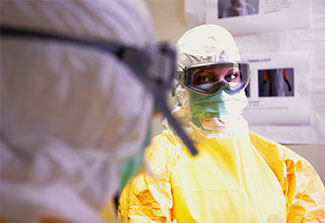Fogarty funds additional grants to support research training in Ebola-affected countries
September / October 2017 | Volume 16, Issue 5

Photo by Cleopatra Adedeji/CDC, CC BY 2.0
Ebola struck hardest in three West African countries that had little scientific capacity to monitor or respond to the 2014-2016 outbreak. To better prepare health officials in Guinea, Liberia and Sierra Leone to deal with future infectious disease epidemics, Fogarty has issued a second round of four grants to help the countries develop research training plans through its
Emerging Epidemic Virus Research Training for West African Countries with Widespread Transmission of Ebola program.
In Guinea, an award will strengthen an ongoing south-south collaboration between Mali's University of Science, Technique and Technologies of Bamako and the University of Conakry to develop advanced degree and non-degree programs. The effort, which stresses clinical and health services research, brings together two French-speaking countries and principal investigators who were on the frontlines of the Ebola epidemic. It also draws on the expertise of researchers from NIH's National Institute of Allergy and Infectious Diseases (NIAID), Johns Hopkins University and Northwestern University.
The other three grants focus on Liberia. Boston University will use its award to assist the University of Liberia's (UL) medical school and health ministry to strategize how to deploy training to address both a shortage of scientific faculty and lack of opportunity for mentored research. In addition, the University of California, San Francisco will collaborate with UL and UCLA to devise a master's-level training program for clinical and epidemiologic research in collaboration with PREVAIL, the Partnership for Research on Ebola Virus in Liberia, a clinical research initiative supported by NIAID. Finally, the University of Hawaii will team up with the University of Yaoundé in Cameroon to improve biomedical sciences at UL where only about one-third of the biology department faculty have degrees above the bachelor's level. Initial goals include devising a career development plan, determining how to strengthen the curriculum and assessing the feasibility of distance learning.
The Fogarty program is intended to help institutions prepare to compete for larger, longer-term grants to implement their research training plans. In 2016, the first year of the program, Fogarty
made four awards to fund projects in Sierra Leone and Liberia.
2017 Planning Grants for Emerging Epidemic Virus Research Training for West African Countries with Widespread Transmission of Ebola
More Information
To view Adobe PDF files,
download current, free accessible plug-ins from Adobe's website.